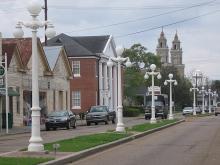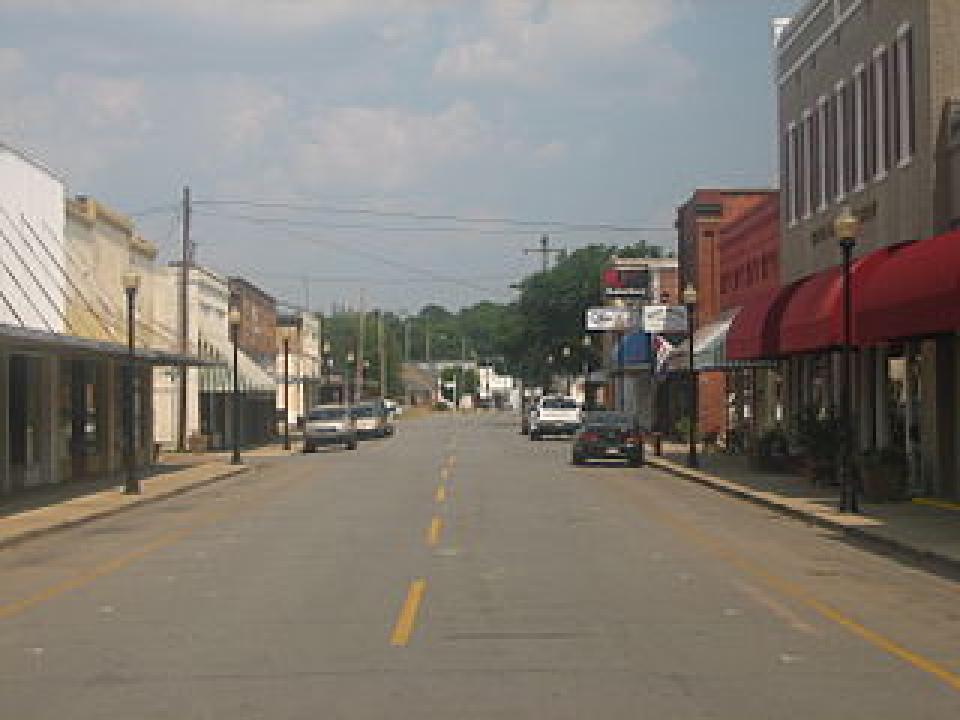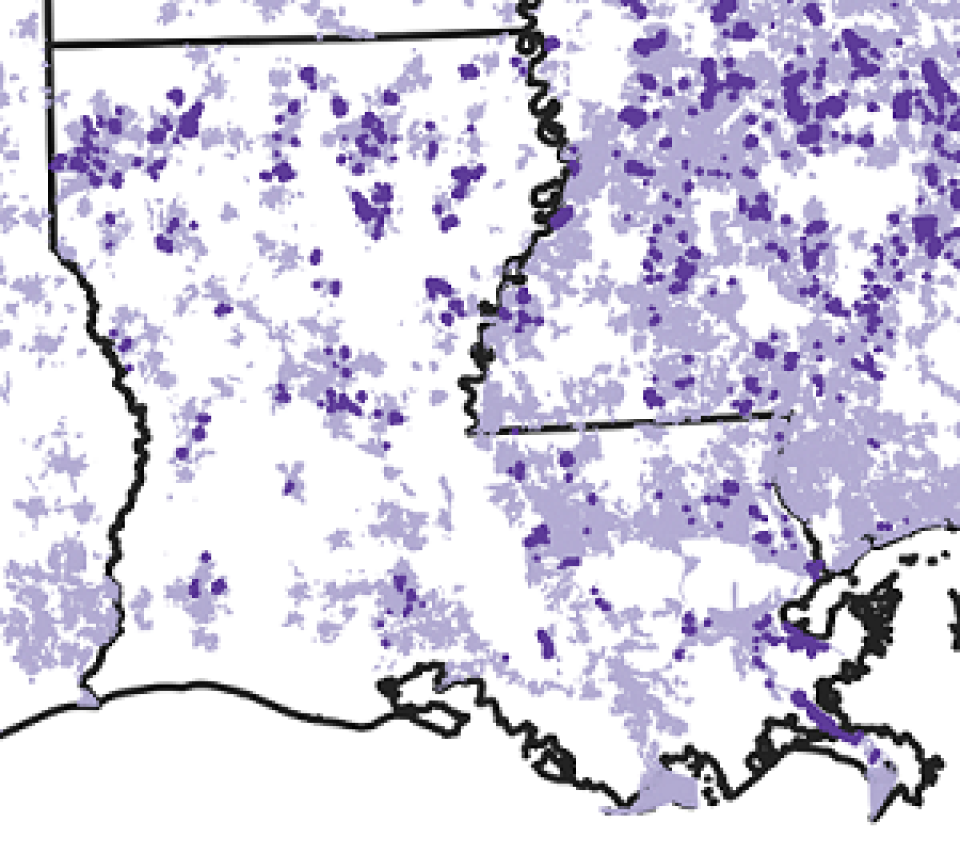
Fast, affordable Internet access for all.

North Louisiana has more premises unserved with high-speed Internet access than any other region of the state. In an effort to bring reliable Internet access to its members who have gone without service, directors of the Northeast Louisiana Power Cooperative (NELPCO) recently agreed to pursue a $54 million fiber buildout.
During a special meeting called on June 29th, NELPCO’s Board of Directors voted 5-2 to begin providing high-speed Internet access across the seven rural parishes the cooperative serves through its wholly-owned subsidiary, Volt Broadband LLC.
The exact details of the project and how it will be funded are still being worked out. But, the cooperative is preparing to bond for $50 million to deploy fiber infrastructure across its 2,180-square-mile service territory, which runs from “south of Turkey Creek Lake in Franklin Parish north to the Arkansas line, and extends into Morehouse Parish,” according to the cooperative’s website.

Construction of the fiber network will be completed in segments, beginning in the most populated regions and extending to the most rural, to eventually serve all 11,000 co-op members.
The cooperative will put up the majority of its capital credit – $30 million – as collateral to secure the bond. “Capital credits are retained margins left over at the end of the year at nonprofit electric cooperatives such as NELPCO,” Board of Director member Thad Waters told The Franklin Sun. “This is the most significant source of equity for most cooperatives, and capital credits reflect each member's ownership in the cooperative.”
Aiming to Reinvigorate Industry
Positioned in the delta of rich soils between the Ouachita and Mississippi rivers, agriculture has dominated the economy of Louisiana’s northeast region for centuries. Where once cotton was king, driving through the region today you will see fields of flourishing corn, cotton, rice, soybean and sweet potato crops.
NELPCO Directors are especially enthusiastic about the benefits a well-established broadband connection would bring to individuals working in the agriculture industry across the co-op’s service territory, according to the September edition of Powerlines magazine [pdf].
Volt Broadband promises to reenergize the regional industry by allowing farmers to experiment with precision agriculture, a farming strategy which utilizes advanced technologies to control and track the growth of crops using data analytics and machine learning. Precision agriculture increases crop yields and makes farming more efficient, while reducing labor demands, minimizing resource waste, and lowering costs.
The new fiber network will further assist in reinvigorating northeast Louisiana’s manufacturing sector at a time

when the coronavirus pandemic has crippled many local businesses. Northeast Louisiana has miles upon miles of open land to entice companies to relocate there. But, without reliable broadband infrastructure the number of new businesses moving to the region has stagnated.
Near NELPCO’s service territory, in the city of Monroe, fiber infrastructure owned and operated by AT&T is attracting new business to town. Recently, the company Coast Professional brought over 100 jobs to West Monroe when the business located its main office in the north Louisiana city instead of in New York, reports KNOE. With the addition of Volt Broadband, NELPCO aims to create a similar magnet for economic development opportunities in northeast Louisiana's less-populated parishes.
“Reliable and affordable Internet service is critical to healthcare, education, commerce and public safety. Businesses need it, students doing homework assignments need it, and rural communities need it to survive,” said Louisiana Public Service Commissioner Foster Campbell. “This is good news for the people and business owners served by Northeast Louisiana Power Co-op.”
Broadband Out of Reach for Many in the Region
Louisiana maintains tough legal restrictions against municipal broadband. Although the state's preemption law does not prohibit local governments from providing broadband services, its mere presence provides a fertile playground for incumbent providers, like BellSouth, AT&T, and Cox to create mischief, discouraging local governments from stepping in to provide these services even when private companies refuse to do so.
Louisiana also requires a referendum, which are typically one-sided affairs where incumbents outspend community network advocates anywhere from 10:1 to 60:1. Local governments are typically prohibited from encouraging voters to take one side or the other. Imputed costs create a variety of opportunities for private providers to delay and obstruct the public network as they are subjective determinations.
Access to broadband infrastructure isn’t the only issue at hand. Affordable high-speed Internet, even where it is available, is out of reach for thousands of northeast Louisiana households.
In Franklin Parish, only 51 percent of households have broadband Internet subscription and only 36 percent of households have access to Internet connections delivering upload/download speeds of 25/3 megabits per second (mbps).
In Morehouse Parish, only 53 percent of households have broadband subscriptions and only 65 percent of households have access to a computer. These figures are drastically lower than national averages — 82 percent of U.S. households have broadband subscriptions and 90 percent of U.S. households have a computer, according to U.S. Census data.
Currently, options for Internet service in northeast Louisiana include DSL, fixed wireless and limited fiber service options through AT&T, cable Internet service through Comcast, wireline Internet service options through CenturyLink, and some satellite options. Many premises in the region only have access to one service option, and many regions have no reliable Internet access option at all.
While AT&T has built fiber infrastructure to select premises in northeast Louisiana, AT&T has focused those investments in more populated areas of higher income, such as the cities of Monroe and Arcadia.
And while AT&T is building limited fiber infrastructure in the area, the telecom giant is also exacerbating the digital divide afflicting the region by proposing to disconnect thousands of households in the deep south from some of its DSL options. The company began phasing out its ADSL Internet service in October of 2020. Many of the households which will be disconnected have no other wireline service option available. The decision to phase out ADSL service will leave 4,200 households across Louisiana without wireline Internet access.

In the map to the right, the light purple regions are those with access to DSL service through AT&T, while the dark purple regions are those being cut off from AT&T’s ADSL service option.
There is also a great need for more affordable Internet service in northeast Louisiana, which was made evident when more Louisiana households per capita than any other state signed up for the $50 stipend provided to eligible households for Internet service through the FCC’s Emergency Broadband Benefit program.
“We have to think about innovative ways of getting high-speed Internet service for everyone in Louisiana who wants it, and Northeast Louisiana Power Co-op is in a unique position to provide this service using their existing infrastructure,” Commissioner Campbell said. “North Louisiana has more unserved and underserved territory than any other part of the state, so that’s where the need is greatest.”
The Northeast Louisiana Power Co-op, which began delivering essential infrastructure 83 years ago when it brought its members electricity, has the chance to continue that legacy by providing fiber Internet service to its members today.
State and Federal Funding Opportunities
The cooperative is keeping a close eye on federal broadband funding opportunities and is hoping to access a portion of the billions of dollars included for broadband and clean energy initiatives in the infrastructure relief package which passed the U.S. Senate in August.
NELPCO also stands to benefit from the Coronavirus Capital Projects Fund, a federal relief program enacted by the American Rescue Plan, which will issue aid in the form of state block grants for states to confront the need for improved broadband connectivity exposed by the pandemic. The guidance for the program [pdf] recently released by the U.S. Treasury directs states to prioritize “projects that involve broadband networks owned, operated by or affiliated with local governments, nonprofits and cooperatives — providers with less pressure to generate profits and with a commitment to serving entire communities.”
Unserved regions of the cooperative’s service territory will also make the project eligible to receive grants through the state’s Granting Unserved Municipalities Broadband Opportunities (GUMBO) broadband grant program, which will open for applications later this year.
Though it is too soon to see the impact these opportunities will have on NELPCO’s broadband initiative, with many more state and federal broadband funding programs in the pipeline for 2021, the co-op has its choice of prospects to access seed funding for the project.
Header image of Main street in Franklin by Wikimedia Commons user Piccor via Creative Commons Attribution-Share Alike 4.0 International
Image of Downtown Winnsboro, LA by Wikimedia Commons user Bill Hathorn via Creative Commons Attribution-Share Alike 4.0 International
